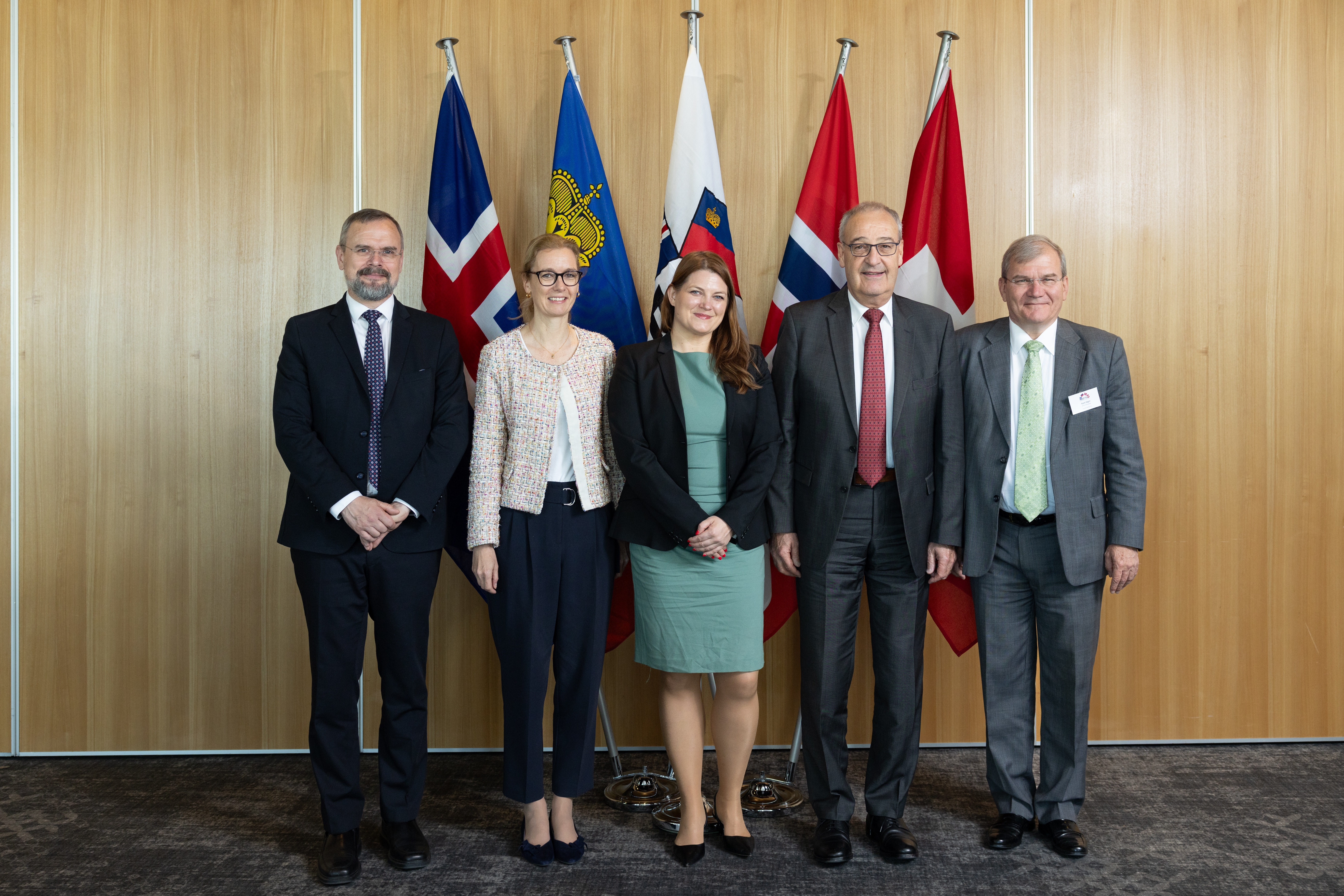The meeting was chaired by Ms Cecilie Myrseth, Minister of Trade and Industry of Norway. Ministers of the four EFTA States (Iceland, Liechtenstein, Norway and Switzerland), together with H.E. Tengku Zafrul Aziz, Minister of Investment, Trade and Industry of Malaysia, signed the Economic Partnership Agreement concluded in April between EFTA and Malaysia.
EFTA preferential trade relations
Ministers celebrated developments in EFTA’s global trade relations since their last meeting in June 2024, notably the signing of new agreements with Thailand, Malaysia and Kosovo, and of the modernised agreement with Ukraine — a clear signal of EFTA’s continued commitment to economic openness in times of growing global fragmentation and trade tensions.
Ministers took stock of the ongoing negotiations with MERCOSUR and Vietnam, and undertook to advance negotiations, particularly with MERCOSUR, where the parties are nearing conclusion. Similarly, Ministers discussed the ongoing negotiations on a digital economy agreement (DEA) with Singapore and urged negotiators to push for conclusion.
Regarding the Trade and Economic Partnership Agreement (TEPA) with India signed in March 2024, Ministers welcomed the progress made towards the agreement’s entry into force, which will likely take place in the second half of 2025. In anticipation of this, EFTA is continuing to prepare for the implementation of the investment promotion and cooperation commitments under the TEPA.
Noting the current tensions in global trade relations, Ministers reaffirmed the value of EFTA’s growing free trade network, and committed to exploring opportunities to develop it further. Specifically, Ministers identified Canada, Mexico and the Republic of Korea as priority partners for modernisation, and reaffirmed their willingness to initiate these processes. Beyond existing free trade partners, Ministers discussed the importance of EFTA’s activities with potential partners, including the implementation of the Joint Declaration on Economic Cooperation with ASEAN, and the importance of identifying opportunities for collaboration with other countries, notably in Africa.
Horizontal files
Regarding EFTA’s work on horizontal files, Ministers commended the expansion of the organisation’s preference utilisation monitor to EU Member States and the United Kingdom, as well as the creation of a dedicated SME Information Hub on the EFTA website. They also noted the completion of EFTA’s first ex-ante sustainability impact assessment on a free trade agreement (FTA) between EFTA and Thailand, published in September 2024.
Recalling the entry into force of the revised Pan-Euro-Mediterranean (PEM) Convention in January 2025, Ministers undertook to finalise the implementation of dynamic links to the PEM Convention in remaining FTAs with PEM partners.
Relations with the European Union
Ministers reiterated the importance of close and values-based cooperation with the European Union in the current geopolitical environment and amid increasing global trade tensions. In this context, they underlined the important coordination between the three EEA EFTA States – Iceland, Liechtenstein and Norway – and the EU on various pressing issues, including the implementation of sanctions against Russia and Belarus.
Ministers underlined the importance of ensuring the swift incorporation of EEA-relevant legal acts into the EEA Agreement. They repeated the EEA EFTA States’ commitment to reducing the number of acts outstanding to uphold legal certainty and homogeneity in the European Economic Area.
They furthermore emphasised the importance of continuing the work on assessing EU cross-sectoral initiatives that impact the Internal Market while also serving policy objectives outside the traditional scope of the EEA cooperation, as these initiatives may have implications for the EEA EFTA States and their participation in the Internal Market.
Ministers stressed the need to highlight that the EEA EFTA States are an integral part of the Internal Market and deeply integrated in European value chains. Developments related to trade or economic security should not adversely affect the close and reliable partnership between the EEA EFTA States and the EU, which is based on equal access to the Internal Market. The Internal Market consists of Iceland, Liechtenstein and Norway in addition to the 27 EU Member States, and it is in the shared interest of all 30 EEA States that the EEA EFTA States are included in its strategic evolution.
Finally, Ministers underlined the importance of pursuing outreach activities to strengthen awareness and knowledge of the EEA Agreement, including by fostering increased transparency of EEA processes.
Relations between Switzerland and the EU
Ministers were informed about the negotiations between Switzerland and the EU on a new package of agreements aiming to stabilise and further develop bilateral relations to the benefit of both sides. The negotiations, which began in March 2024, were formally concluded in May 2025. The negotiated package is composed of several thematic elements, including new agreements and institutional solutions. It is now going through the respective approval processes of the parties.
Advisory Bodies
Ministers met with EFTA’s Advisory Bodies, the Consultative Committee and the Parliamentary Committee, for their regular dialogue on EFTA activities. Parliamentarians and representatives from trade unions and employers’ organisations from the four EFTA States discussed EFTA’s trade policy, including the state of play in current processes and possible future orientation. They also discussed the modernised EFTA–Ukraine FTA and its interlinkages with Ukraine’s reconstruction more generally.
Attending:
Iceland: Mr Daði Már Kristófersson, Minister of Finance and Economic Affairs
Liechtenstein: Ms Sabine Monauni, Deputy Prime Minister, Ministry of Foreign Affairs, Environment and Culture
Norway: Ms Cecilie Myrseth, Minister of Trade and Industry (Chair)
Switzerland: Mr Guy Parmelin, Vice President, Federal Councillor, Head of the Department of Economic Affairs, Education and Research
EFTA Secretariat: Mr Kurt Jäger, Secretary-General
EFTA Ministerial 2025 Communiqué
Conclusions on EFTA internal and external relations
Conclusions on Standing Committee
